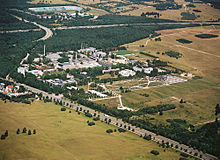Helmholtz Centre Munich
The Helmholtz Zentrum München - German Research Center for Health and Environment ( HMGU ) is a large research center based in Neuherberg north of Munich . It is a member of the Helmholtz Association of German Research Centers . His research work is integrated into the Helmholtz research areas “Earth and Environment” and “Health”. It was founded on May 31, 1960 as a test and training facility for radiation protection of the Society for Nuclear Research . This resulted in the Society for Radiation Research (GSF) in the organizational form of a GmbH on June 23, 1964 .
According to the articles of association of February 13, 1978, 90% of the shareholders are the Federal Republic of Germany (represented by the Federal Minister for Education and Research ) and 10% are the Free State of Bavaria (represented by the Bavarian State Minister of Finance ).
Until the end of 2007 it was called "GSF - Research Center for Environment and Health", the acronym "GSF" going back to the previous name "Society for Radiation Research".
Following a realignment at the beginning of 2008, the main focus of research is on environmental health , i.e. the influence of environmental factors on health. This applies in particular to a number of complex chronic diseases such as lung diseases, allergies , diabetes mellitus , dementia and depression , which are largely determined by personal risk factors, lifestyle and environmental conditions.
The center is involved in all six German health research centers, which have been networking scientists from university and non-university institutions since 2009 in order to quickly bring research results into medical application. It is a partner in five of the six newly established centers and the headquarters of the German Center for Diabetes Research (DZD).
structure
legal form
The company is an institution of the federal government and the Free State of Bavaria in the legal form of a GmbH . The federal government and the Free State finance the center in a ratio of 90:10.
As of 2017, the organization had 2264 employees in 56 institutes and independent departments. After the number of employees had increased by around 400 within a year, financial difficulties arose in 2019 due to the rapid expansion. In August 2019, the management announced job cuts and restructuring with a strengthening of health issues.
Headquarters
The head office is in the Oberschleißheim district of Neuherberg near the Munich city limits on a 52.3 hectare research campus. In addition, the center maintains research facilities in the city of Munich such as the hematology center and clinical cooperation groups together with the Munich universities ( LMU and TUM ). On July 12, 2010, the CPC (Comprehensive Pneumology Center) was opened in the presence of the then Federal Research Minister Annette Schavan . Further locations are Augsburg and Tübingen.
management
The company is run by a scientific and a commercial director. From 2013 a managing director for scientific and technical infrastructure was added.
The scientific management:
- 1960–1964: Otto Hug
- 1960–1981: Rudolf Wittenzellner
- 1981–1990: Hans Wolfgang Levi
- 1990–1995: Joachim Klein
- 1995–2005: Ernst-Günter Afting
- 2005–2018: Günther Wess
- Since August 2018: Matthias Tschöp
Management for scientific and technical infrastructure:
- 2013–2018: Alfons Enhsen
- Since 2019: Kerstin Günther
Institutes and facilities
As of November 2018 there are the following institutes and independent departments:
Diabetes Center
- Institute for Diabetes and Cancer (IDC)
- Institute for Diabetes Research (IDF)
- Institute for Diabetes Research and Metabolic Diseases (IDM)
- Institute for Diabetes and Obesity (IDO)
- Department of NeuroBiology of Diabetes (NBD)
- Institute for Diabetes and Regeneration Research (IDR)
- Institute for Translational Stem Cell Research (ITS)
- Institute for Functional Epigenetics (IFE)
- Department of Molecular Epigenetics (MEG)
- Institute for Research on Pancreatic Islet Cells, Paul Langerhans Institute Dresden (IPI)
- Department of Molecular Endocrinology and Metabolism (MEM)
Genetics & Epidemiology
- Institute for Developmental Genetics (IDG)
- Institute for Epidemiology (EPI)
- Department of Molecular Epidemiology (AME)
- Independent Research Group Clinical Epidemiology (KEPI)
- Institute for Experimental Genetics (IEG)
- Genome Analysis Center (GAC)
- Institute for Genetic Epidemiology (IGE)
- Health Economics and Healthcare Management (IGM)
- Institute for Human Genetics (IHG)
- Institute for Neurogenomics (ING)
- Institute for Translational Genomics (ITG)
- Comparative Medicine Department (AVM)
Health & Environment
- Gene Vectors Department (AGV)
- Department of Apoptosis in Haematopoietic Stem Cells (AHS)
- Department of Molecular Immune Regulation (AMIR)
- Comprehensive Molecular Analytics (CMA)
- Institute for Epidemiology (EPI)
- Department of Molecular Epidemiology (AME)
- Institute for Allergy Research (IAF)
- Institute for Asthma and Allergy Prevention (IAP)
- Institute for Environmental Medicine (IEM)
- Institute for Lung Biology (iLBD) / Translational Center for Lung Research (CPC)
- Institute for Innovative Radiation Therapy (iRT)
- Institute for Radiation Biology (ISB)
- Institute for Radiation Protection (ISS)
- Lung Repair and Regeneration Department (LRR)
- AG Tissue Controlled Immunocytes (TCI)
- Translational Molecular Immunology (TMI)
- Institute for Virology (VIRO)
- Radiation Cytogenetics Department (ZYTO)
Stem cells
- Institute for Epigenetics and Stem Cells (IES)
- Institute for Stem Cell Research (ISF)
- Department of Sensory Biology and Organogenesis (SBO)
Enabling Technologies
- Analytical Pathology Department (AAP)
- Institute for Bioinformatics and Systems Biology (IBIS)
- Institute for Biological and Medical Imaging (IBMI)
- Institute for Computational Biology (ICB)
- Scientific Computing Department (ASC)
- Institute for Medicinal Chemistry (IMC)
- Protein Analysis Department (PROT)
- Institute for Molecular Toxicology and Pharmacology (TOXI)
- Cellular Signal Integration Department (AZS)
- Institute for Structural Biology (STB)
Environmental Science
- Analytical Biogeochemistry (BGC)
- Institute for Biochemical Plant Pathology (BIOP)
- Experimental Environmental Simulation Department (EUS)
- Comparative Microbiome Analyzes (COMI)
- Institute for Groundwater Ecology (IGOE)
- Environmental Isotope Chemistry Department (EOIC)
- Institute for Network Biology (INET)
- Department of Genomics and Systems Biology of Plant Genomes (PGSB)
Research priorities
Society for Radiation Research
The research focus of the experimental and training facility for radiation protection, which became an independent Society for Radiation Research (GSF) in 1964 , was hematological research, studies on repository safety and groundwater protection, radiation and nuclear biology. Between 1972 and 1982 the Helmholtz Zentrum München also operated the Neuherberg research reactor ; the nuclear reactor is now in what is known as safe enclosure . From 1964 to 2009, the GSF and Helmholtz Zentrum München were members of the German Atomic Forum , a lobby association that advocates the non-military use of nuclear energy .
Asse research mine
The GSF and the Helmholtz Zentrum München operated the 27.6 hectare Asse research mine for the final storage of radioactive waste in Remlingen near Braunschweig from 1967 to the end of 2008 . In 2009, the ownership of the Asse mine was transferred to the Federal Office for Radiation Protection after irregularities became known. The Federal Office accused the center of the fact that the research mine had been misused for decades as a repository for nuclear waste . The company was advised in this affair by, among others, the lawyer Gerald Hennenhöfer , who had previously worked as head of the reactor safety department of the Federal Ministry for the Environment and later as chief representative for economic policy of the energy company Viag .
GSF - Research Center for Environment and Health
The Institute for Ecological Chemistry , founded in 1969 by Friedhelm Korte , was already doing pioneering work in the risk assessment of chemicals in the environment. From 1977 the center as a whole increasingly focused on environmental research. This is documented in 1990 when it was renamed GSF - Research Center for Environment and Health .
Helmholtz Zentrum München - German Research Center for Health and Environment
Following a realignment at the beginning of 2008, the main focus of research is on environmental health , i.e. the influence of environmental factors on health . This applies in particular to a number of complex chronic diseases such as lung diseases , allergies , diabetes mellitus , dementia and depression , which are largely determined by personal risk factors, lifestyle and environmental conditions. The aim is to closely link research and application through an interdisciplinary and translational research approach. H. Basic research and application are closely linked.
education
The company trains in different areas. This includes both apprenticeships such as biology laboratory technicians and the offer for students to write their bachelor's or master's thesis. The Helmholtz Graduate School Environmental Health (HELENA) opened on November 1, 2010. It is a joint initiative of the Helmholtz Zentrum München, the Ludwig Maximilians University of Munich and the Technical University of Munich to promote doctoral students . In addition, there are programs to promote scientific executives (Postdoctoral Fellowship Program and Junior Research Groups with tenure track)
Further education and training
The Institute for Radiation Protection at the Helmholtz Zentrum München offers courses for acquiring and updating specialist knowledge in radiation protection, including the necessary handling techniques. Together with the Society for Toxicology (GT) and the German Society for Experimental and Clinical Pharmacology and Toxicology eV (DGPT), the advanced training program "Specialist toxicologist DGPT" is organized.
Offers to the public
In cooperation with the German Center for Lung Research (DZL), the company has set up a lung information service as an offer for patients, relatives and the interested public and, together with the Munich-based Bang eG, founded the Respiratory Foundation to promote lung research. At the same time, the national diabetes information portal (diabinfo.de) is operated in cooperation with the German Center for Diabetes Research (DZD) and the German Diabetes Center (DDZ). In addition, an allergy information service was launched in April 2017 with the support of the Federal Ministry of Health.
Web links
Footnotes
- ↑ helmholtz-muenchen.de: HelmholtzZentrum münchen: German Research Center for Health and Environment, About Us: Profile , accessed on March 2, 2019.
- ^ Gudrun Passarge: Helmholtz Center in need of money. In: www.sueddeutsche.de. August 8, 2019, accessed August 9, 2019 .
- ↑ Michael van den Heuvel: Research Minister Schavan opens new lung research center in Munich. July 12, 2010.
- ↑ helmholtz-muenchen.de: locations , accessed on January 11, 2016.
- ↑ helmholtz-muenchen.de: Organization / Organigramm , accessed on March 2, 2019.
- ↑ helmholtz-muenchen.de: HelmholtzZentrum münchen: 2010 annual report (PDF; 29.5 MB; 222 pages), accessed on March 2, 2019.
- ↑ helmholtz-muenchen.de: Organization / Management , Organigramm (PDF; 163 kB; 1 page) , accessed on March 2, 2019.
- ↑ Christiane Grefe : Atomic waste: An underground story. In: The time . No. 44, October 22, 2009.
- ↑ Letter from the Federal Government ( Memento of the original from January 17, 2012 in the Internet Archive ) Info: The archive link was inserted automatically and has not yet been checked. Please check the original and archive link according to the instructions and then remove this notice. (PDF; 473 kB) accessed on April 1, 2011
- ↑ Further procedure for the Asse mine. ( Memento of September 17, 2008 in the Internet Archive ) Press release 149/2008 of the BMBF .
- ↑ Radioactive waste - Federal Office cannot guarantee the safety of the Asse nuclear storage facility. In: Spiegel Online. June 4, 2009.
- ^ Legal concerns against designated nuclear supervisor Berliner Zeitung from January 11, 2010
- ↑ Results reports under Helmholtz Zentrum München: Research priorities. ( Memento from February 6, 2010 in the Internet Archive )
- ^ Website of the Helmholtz Graduate School Environmental Health.
- ↑ website
- ↑ Website of the radiation protection courses.
- ^ Website of the courses on specialist toxicology.
- ^ Website of the lung information service.
- ↑ diabinfo.de , website of the national diabetes information portal
- ↑ Website of the Allergy Information Service. Retrieved July 11, 2017 .
- ^ Federal Minister of Health Hermann Gröhe :. Retrieved February 9, 2017 .
Coordinates: 48 ° 13 ′ 21 ″ N , 11 ° 35 ′ 36 ″ E

